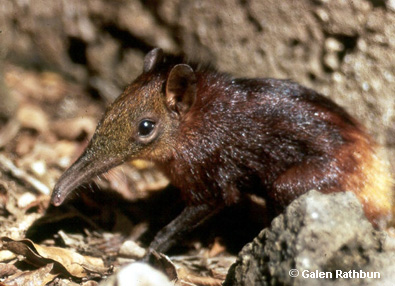This month EDGE are thrilled to announce another new EDGE Fellow : Grace Wambui Ngaruiya.
Hi my name is Grace Wambui Ngaruiya and I live in Kenya in a small Rift valley province town called Ngong on the outskirts of the capital city – Nairobi.
Currently I am pursuing a MSc. degree in Biology of Conservation at the University of Nairobi. I graduated with a degree in Zoology from the same university and worked in Eastern province – Kenya, assessing the effect of ranch subdivision on biodiversity.
My project is on the little known but endangered and endemic small mammal known as the Golden-rumped elephant-shrew (GRES). It is found in forests at the northern Kenyan coast. Confirmed location and conservation of the GRES is in Arabuko-Sokoke Forest and Gede National Monument in Malindi. The population studies carried out in the 2 forests show that the GRES population is slowly declining hence the need to locate other populations of the species to create a comprehensive conservation plan.
In 1971 a single sighting and subsequent interviews with residents of Milimani village near Boni forest gave indications that the GRES may be present in the area.
My research is based on determining the current distribution of the GRES and its habitat quality in the unknown Boni forest and if possible Dodori forest. This will be accomplished by use of transects to locate the species and also by use of interviews to find out if the local people have seen the species and their view of the animal.
I am excited to do this research because of various reasons but the major one is because the GRES is only found in my country- Kenya, so I am treating it like a national treasure that if lost will never be recovered. Therefore to be involved in ensuring its survival is an important task for me that takes conservation to a whole new level.
Secondly, tourism generates a lot of income in my country therefore if the species is conserved successfully then I believe that tourists and researchers will be able to see the species benefiting both conservation and the country in terms of funds availability.

